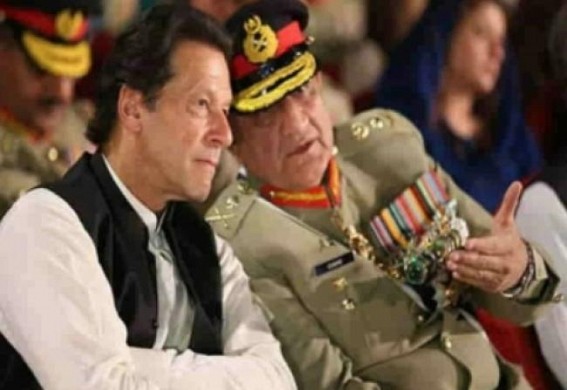TIWN

Islamabad, March 11 : Imran Khans political career has prospered by the extended support of the military establishment, from the famous 2014 long march and protest sit-in in Islamabad for over 120 days, to him becoming the Prime Minister of Pakistan in 2018.
Khan, also chief of the Pakistan Tehreek-e-Insaf (PTI) party, has enjoyed the perks of military support and this was one of the reasons why the opposition parties had called him "selected" instead of "elected" Prime Minister of the country.
However, when he became the Prime Minister, his relations with the military establishment took a U-turn, which many say was due to realisation within the military establishment of their miscalculations related to Khan and his capabilities.
Khan was most certainly the blue-eyed boy of the military establishment. He was supported before by the then ISI chief General (Retd) Ahmed Shuja Pasha, who was believed to the mastermind behind the 2014 protest sit-in against Nawaz Sharif's government.
"The 2014 PTI Dharna was the brainchild of the former ISI chief. General Pasha had vowed to oust Nawaz Sharif, Khawaja Asif and Chaudhry Nisar at all costs," Javed Hashmi, a former PTI president, said.
The PTI chief's support by the military establishment also played pivotal role in bringing him into power during 2018 as the then Chief of Army Staff (COAS) General Qamar Jawed Bajwa along with the ISI, extended complete support to Khan and his narrative of accountability.
However, after 2018 till April 2022, Khan's ability to extend the existing relations with countries like Saudi Arabia, the US, China and the UAE, coupled with expectations from him of fixing the tainted image of Pakistan in front of the world through his celebrity image and aura, backfired in a way that created more challenges for Islamabad and increased concerns of all regional countries and the western states in terms of cooperation with the country at any and all levels.
"Imran Khan claimed he would bring in tons of foreign aids through remittances sent by overseas Pakistanis, which did not happen. He damaged Pakistan's relations with the Arab world by announcing to launch a parallel alliance to the Organization of Islamic Cooperation with Malaysia and Turkey," said Kamran Yousaf, a senior analyst.
"He started eyeballing the US and the West after NATO withdrawal from Afghanistan. He even forced Chinese companies to halt their operations under the China Pakistan Economic Corridor (CPEC). All these things caused serious damage to Pakistan's regional standing and its foreign policy.
"And to top it all, Khan completely wrote off his opposition parties, their existence and centred his focus on putting them behind bars without the understanding of right of wrong, just of unjust, legal or illegal. He refused to talk to them, to create an understanding in the parliament. And he kept his eyes closed on the wrongdoings of his own party members," he added.
Khan's shortcomings, specifically in view of serious reservations and concerns shared by friendly countries, are considered as one of the reasons why the military establishment decided to take a step back from supporting and as many term as "spoon feeding" him in managing the government.
"It is also believed that Khan also created a division within the military establishment as the extended support of General Bajwa and ISI chief Faiz Hameed, were not appreciated by the institution at large, who felt that the institution had fallen down from its position, only to support him," said Javed Siddique, senior analyst.
- Russia, after Western Palestinian state recognition move, says it still backs a two-state solution
- Over 800 dead, 1000 injured inEarthquake in Afganistan
- Confident that my visits to Japan and China would further national interests and priorities: PM Modi
- Awami League warns of alarming spike in violence against women, children in Bangladesh
- 12 Killed As Under-Construction Bridge Breaks Into Two In Northwest China



